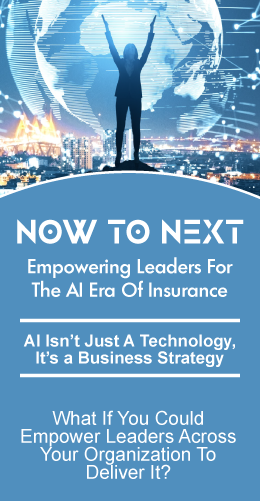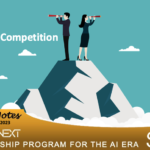
Platforms are a force multiplier of internal and external strengths
Those who have known me for years, know that I was an introvert growing up until I was a junior in high school running for class president. Yes, that surprises people! I had lots of friends across different groups (we can call them different ecosystems), but I was a relatively introspective person. Becoming class president was a catalyst in my becoming an extrovert – which my colleagues and friends recognize me as today. Why do I bring that up? Because over my career I leverage my introvert strengths, my analytical side and my extrovert strengths, my network of colleagues, peers, and others to bring both perspectives to ideas, topics and challenges.
Both personalities play a role in how individuals work within the realm of technology and today’s fast-paced changing world.
Introverts, for example, may utilize their strengths to work on problems and find solutions more self-reliantly and in the background. They may spend more time in thoughtful contemplation about how something is best accomplished. Their genius may find its way to fruition with the use of research, testing, analysis and application. An introvert’s ideas may have a certain cohesion to them because they come from the same mind.
Extroverts, however, have no less genius to apply. They likely approach the same issues and problems with different methods and tools. They bring together diverse teams to consider the issue, split those teams into sub-teams, cultivate the best ideas from both and combine them. Extroverts may open their questions and ideas to the outside world and utilize subject matter experts instead of books. They may tap into outside groups with similar issues. An extrovert’s solutions may look like an anthology of best ideas, applied in a way that is collaborative and customized to the need.
When it comes to insurance platforms, development of and participation in ecosystems signals a shift from an introverted, introspective type of insurance organization, to a more extroverted, open and “best of options” type of organization. This shift, though it may not always be painless, is going to help insurers construct a future-ready foundation. There is resilience, flexibility and “knowledge” that comes with interdependent systems. Ecosystems promise to provide an exciting level of interdependency, but only for insurers who are preparing platforms to interact with them.
Majesco’s recent thought leadership report, “Insurance Platforms — A Burning Platform for Market Leadership in the Digital Era of Insurance,” discusses the power and potential of ecosystems in relation to insurers. Ecosystems encompass a wide sphere of influence within and between industries. Amazon, Apple and Google, for example, have expansive, interconnected ecosystems that primarily operate on the perimeter of the industry, but are increasingly connected to it through customers, channels, partners and others for collaboration or competition, or both. Digital ecosystems related directly to insurer needs, capabilities and data use can provide a foundation and connection to other ecosystems (like Amazon, etc.) to create and extend insurer value to their customers. Digital1st EcoExchangeTM and Majesco’s Digital1st PlatformTM are the new types of ecosystems and ecosystem-ready platforms.
Ecosystems — Threatening or Thrilling?
Michael Davies, Founder and Chairman of Endeavour Partners and Lecturer at MIT and London Business School, stated in an interview at the Shaping Modern Underwriting conference in London that, “The lack of touchpoints between insurer and customer is something that’s well studied, and the industry has long been trying to make insurance more than a once-a-year engagement.” He highlighted that new technologies in general, and digital ecosystems in particular, will bring about transformative change that will happen whether insurers avoid or embrace it.[i]
Davies noted both the threat and the potential of ecosystems. The threat is that some of the largest companies that utilize digital ecosystems don’t necessarily care about making money with insurance, rather they are simply willing to step into insurance in order to enhance their ecosystems services. In doing so, these players vastly increase their share of customer data – and this is the battleground, particularly with the “Big Tech” players, a big threat which was identified in our Strategic Priorities research (see Figure 1).
Figure 1: Insurers expect Amazon and Google, among other Tech Giants, to enter the insurance market

From a potential perspective, Davies notes that collaborating with these larger digital ecosystems has a significant upside. Digital ecosystems offer constant touchpoints with customers in simple ways by plugging into capabilities that enable cost-effective growth while bringing insurance coverage closer and more personalized to the customer. Davies asserts that this is critically important, because despite the growing global economy, the insurance protection gap is increasing. Ecosystems and embedding insurance within them would not only reverse that trend but could also lead to significant growth.
Marketing ecosystems — digital channels and pipelines of opportunity
These larger ecosystems could be a threat, or they could be an opportunity. For example, if one considers just the voice-assist digital channels of Amazon Alexa and Google, and the volume of business they represent, most insurers would rather find themselves as cooperators and not competitors to these pipelines that are trying to “own the channel into retail.”[ii] And then consider the growing digital InsurTech marketplaces like Bold Penguin, Coverwallet or others that provide reach to consumers, small businesses and agents/brokers digitally.
Insurance-focused ecosystem growth
On the flip side, there is a whole other world of ecosystem development specifically designed to connect insurers with digital capabilities and data sources that are becoming the fuel for insurance development. With the breadth and velocity of change in technologies, customer risk needs and engagement expectations, it is nearly impossible for any insurer to possess, nor afford the acquisition of, the resources and capabilities needed to keep up with the changes, let alone anticipate and stay ahead of them. A platform-based insurance business model that leverages platform technologies like Cloud, APIs, microservices, AI and machine learning, and digital ecosystems of diverse third-party partner services completely removes this barrier. Insurers can choose from a variety of vetted partner apps and plug into them via APIs, allowing them to quickly and easily create customized MVP products and services that they can, in turn, test with different market segments.
The growth of broader, lifestyle ecosystems or business-specific ecosystems
Another important benefit of the insurance platform is that it greatly enhances an insurer’s ability to “play” within other, broader ecosystems that are being built around lifestyle-based or business-specific opportunities. This creates tremendous potential for both penetrating existing markets and reaching or creating brand new markets.
Swiss Re’s recent report, Digital ecosystems: extending the boundaries of value creation in insurance, noted that these ecosystems can be structured into broad clusters, such as “Home & Stay” and “Lifestyle” on the B2C side, and “Build/Produce” and “Deliver” on the B2B side. Within these clusters, finer-grained domains can be defined, like “Mobility” or “Transport & Logistics.” Insurance fits well as a risk-mitigation component in many of these ecosystem domains, such as mobility, healthcare and housing.[iii]
Insurers can plug into these ecosystems in different ways. Using mobility as an example, insurers could create one unified policy to cover whatever mode of transportation a customer chooses, instead of separate policies for each. In another example, an insurer could provide risk protection services as a component of an ecosystem that provides a one-stop-shop for all of the “jobs” a customer needs to get done across their mobility customer journey…“a single window of interaction that eliminates points of friction between the different participants of the ecosystem.”[iv]
Today’s and tomorrow’s new business models must leverage a business platform and ecosystems that redefine the business model with an outside-in view and a focus on continuous customer engagement. Therefore, creating and participating in ecosystems will be crucially important for insurers as they plan their paths to the Future of Insurance. For an in-depth look at ecosystems and their impact upon insurance platform development, be sure to download, Insurance Platforms — A Burning Platform for Market Leadership in the Digital Era of Insurance.
[i] Eckhart, Daniel, “Digital Ecosystems and insurance: Insights from Michael Davies,” Swiss Re Institute, July 2, 2019, https://www.swissre.com/institute/research/topics-and-risk-dialogues/digital-and-technology/digital-ecosystems-davies-interview.html
[ii] Esber, Dianne, Brian Goffman and Brian Gregg, Discussions in Digital: What’s a marketing ecosystem and what does it mean for marketers?, McKinsey podcast, March 2018
[iii] “Digital ecosystems: extending the boundaries of value creation in insurance,” Swiss Re Institute, January 2019
[iv] ibid







